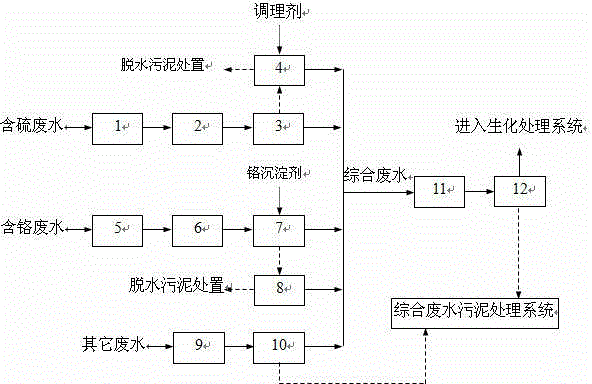Tannery wastewater pretreatment method
A tannery wastewater and pretreatment technology, which is applied in animal processing wastewater treatment, water/sewage multi-stage treatment, water/sludge/sewage treatment, etc. Undisclosed classification of pretreatment sludge disposal related parameters and treatment effects, increasing the treatment load and maintenance difficulty of subsequent adjustment tanks and coagulation sedimentation tanks, etc., to achieve the goal of facilitating comprehensive utilization and final disposal, facilitating stable operation, and reducing dosing costs Effect
- Summary
- Abstract
- Description
- Claims
- Application Information
AI Technical Summary
Problems solved by technology
Method used
Image
Examples
Embodiment 1
[0033] see figure 1 Shown the flow process of the pretreatment method of tannery wastewater of the present invention, this embodiment comprises the following steps:
[0034] (1) The sulfur-containing wastewater collected in the tanning production process passes through the sulfur-containing wastewater grid 1 to filter out large particles of impurities, then flows to the sulfur-containing wastewater adjustment tank 2, and then is lifted to the sedimentation tank 3 for concentrated precipitation, and the sedimentation lasts for 6 hours Finally (at least 6 hours) the supernatant is discharged into the integrated wastewater treatment system; after the concentrated sludge is adjusted to a pH value of 10 by adding sulfuric acid (the pH value is at most 10), the plate and frame filter press 4 is used for dehydration. The dehydration cycle is 4 hours, and the dehydrated clear liquid is discharged into the comprehensive wastewater treatment system, and the sludge is transported outside...
Embodiment 2
[0041] see figure 1 Shown the flow process of the pretreatment method of tannery wastewater of the present invention, this embodiment comprises the following steps:
[0042] (1) The sulfur-containing wastewater collected in the tanning production process passes through the grid 1 to screen out large particles of impurities, then flows to the sulfur-containing wastewater regulating tank 2, and then is lifted to the sedimentation tank 3 for concentrated precipitation, and the supernatant after precipitation for 8 hours The liquid is discharged into the comprehensive wastewater treatment system; after the concentrated sludge is adjusted to a pH value of 9 by adding sulfuric acid, it is dehydrated with a plate and frame filter press 4, and the dehydration cycle is 3 hours. The dehydrated clear liquid is discharged into the comprehensive wastewater treatment system. Further disposal of sludge after transport;
[0043] (2) After the chromium-containing wastewater collected in the t...
PUM
| Property | Measurement | Unit |
|---|---|---|
| Surface load | aaaaa | aaaaa |
| Surface load | aaaaa | aaaaa |
| Surface load | aaaaa | aaaaa |
Abstract
Description
Claims
Application Information
 Login to View More
Login to View More - R&D
- Intellectual Property
- Life Sciences
- Materials
- Tech Scout
- Unparalleled Data Quality
- Higher Quality Content
- 60% Fewer Hallucinations
Browse by: Latest US Patents, China's latest patents, Technical Efficacy Thesaurus, Application Domain, Technology Topic, Popular Technical Reports.
© 2025 PatSnap. All rights reserved.Legal|Privacy policy|Modern Slavery Act Transparency Statement|Sitemap|About US| Contact US: help@patsnap.com



